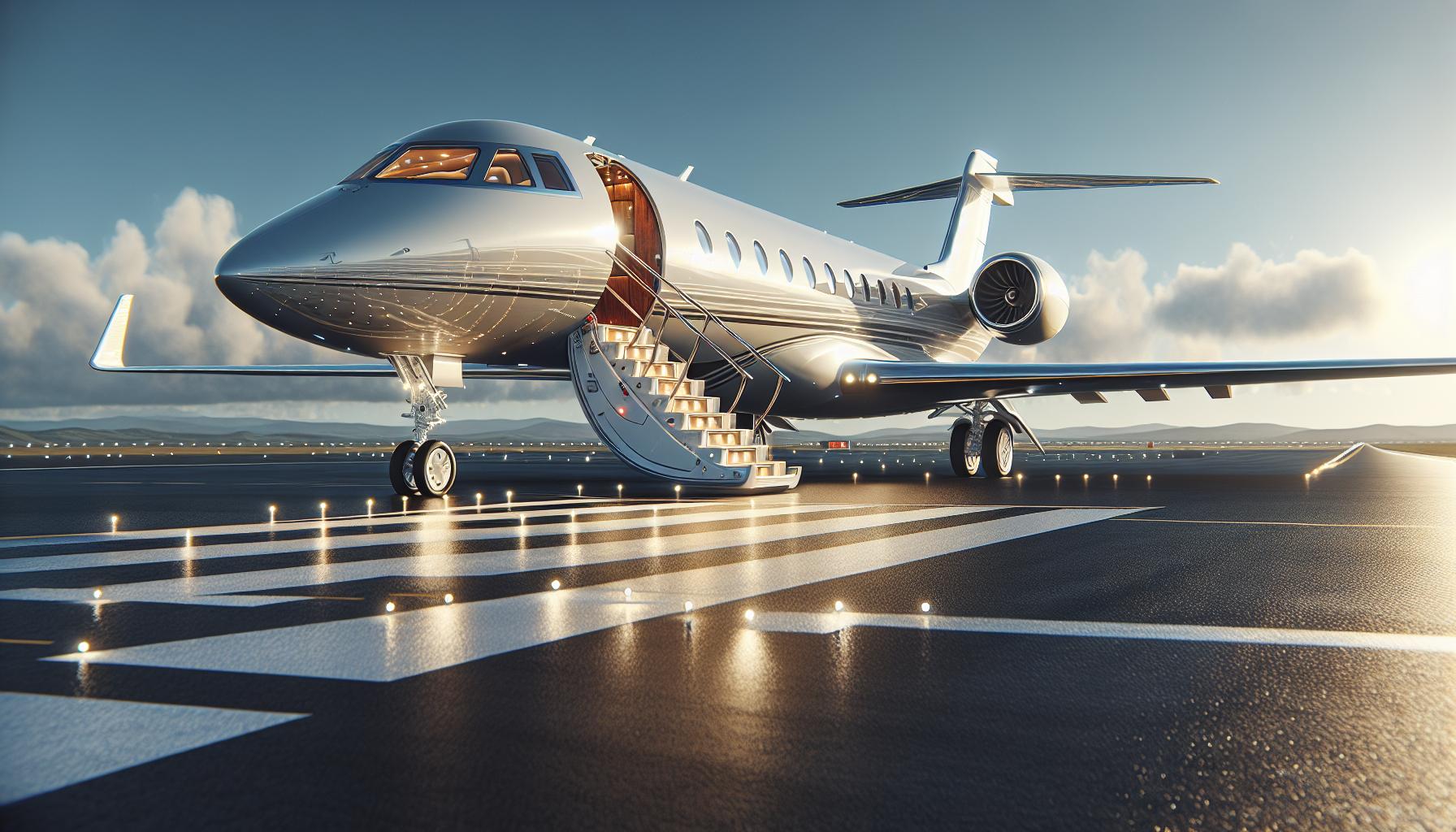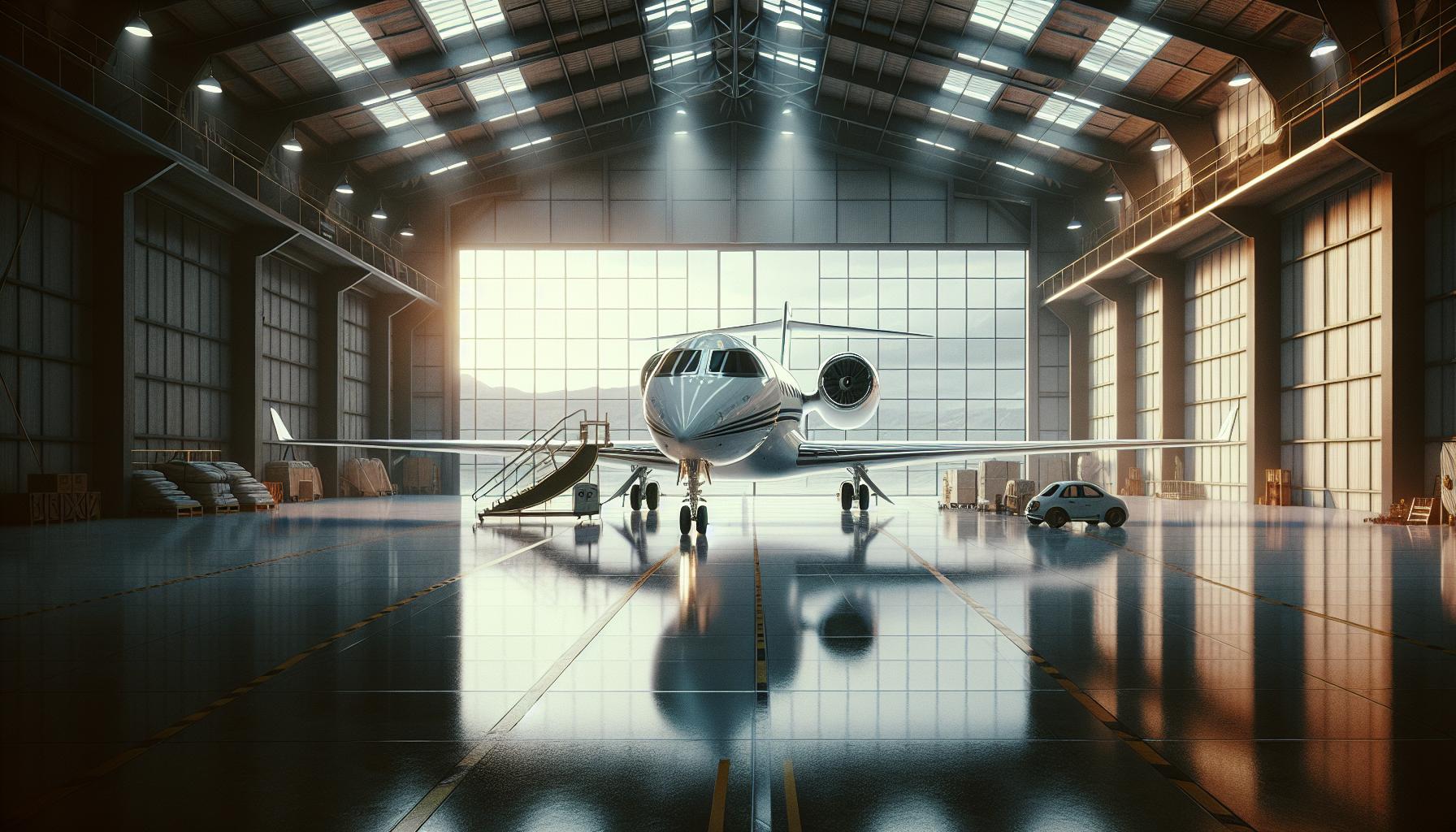
Deciding between renting or owning a private jet is no small feat, and I’ve seen this dilemma from the inside out. With years in the private jet business under my belt, I’ve gathered insights that might just sway your decision.
Whether you’re a seasoned flyer or new to the allure of private aviation, the choice comes down to convenience versus commitment. Stick around as I unpack the pros and cons, helping you navigate this high-flying conundrum with ease.
Trust me, I’ve done my homework, and I’m here to share a well-researched take on what’s best for your lifestyle and your wallet. Let’s dive into the world of private jets and find out if you’re better off signing a lease or holding the keys.
Renting a Private Jet
When I weigh the benefits of renting a private jet, flexibility immediately comes to mind. Renting lets you travel on your own terms with a wide array of aircraft to choose from. You’re not tied down to one type of jet, and that’s a big plus for those who value variety or may have changing travel needs.
Cost-effectiveness is another key factor in renting. Without the hefty upfront purchase price and ongoing maintenance expenses, I’ve observed that renting allows for a more predictable budget. You know the cost upfront, which typically includes the crew, fuel, and other fees associated with the flight.
Moreover, there’s no long-term financial commitment. You’re not on the hook for depreciation costs, which can be substantial in the world of private aviation. And let’s not forget the issue of liquidity; renting a jet means your capital isn’t tied up in a depreciating asset, thereby freeing up funds for other investments or expenses.
Let’s talk about convenience. Renting a jet means I don’t have to worry about the operational aspects of aircraft ownership. Maintenance, storage, and crew management are all handled by the rental company. This hands-off approach is particularly appealing for those who simply want to enjoy the journey without the responsibility.
For those considering jet rentals, here are some typical costs associated with renting a private jet:
| Flight Type | Estimated Cost |
|---|---|
| Light Jet | $2,500 – $3,500 per hour |
| Midsize Jet | $3,800 – $5,000 per hour |
| Heavy Jet | $5,500 – $7,500 per hour |
These are average hourly rates. Keep in mind that prices can vary depending on the rental company, aircraft type, and destination.
Renting also addresses the issue of accessibility. With a wide range of private jet charter companies on the market, it’s often as easy as a few clicks or a phone call to book a jet. There’s no need to concern yourself with scheduling maintenance or ensuring the aircraft is ready for flight.
However, to help you decide if renting is the best choice for your lifestyle, let’s explore the intricacies of jet ownership in the next section.
Owning a Private Jet

When it comes to owning a private jet, the image that often comes to mind is one of ultimate luxury and status. It’s the pinnacle of personal aviation, offering unparalleled freedom and control over your travel experience. But let’s dig into the realities of ownership and what that entails.
First off, owning a jet is a significant investment. Beyond the initial purchase price, there are ongoing operational costs to consider. These include maintenance, storage, insurance, and crew salaries. It’s essential to budget wisely as these expenses can add up quickly.
Here’s a breakdown of some of the annual costs you might expect:
| Expense Type | Estimated Annual Cost |
|---|---|
| Maintenance | $500,000 – $1,000,000 |
| Storage | $50,000 – $250,000 |
| Insurance | $100,000 – $300,000 |
| Crew Salaries | $200,000 – $500,000 |
Remember, these figures can vary greatly depending on the type and age of the jet, how often you fly, and where you’re based.
Yet, for those who fly often, the benefits can be substantial. Owning a jet means being able to customize the aircraft to fit personal tastes and requirements. From the interior design to the in-flight technology, everything can be tailored. Plus, there’s no need to worry about the availability of rentals; your jet is ready whenever you are.
Furthermore, you have the flexibility to fly to remote destinations that might be unreachable by commercial flights or rental jets. And if your jet is not in use, it’s possible to charter it out and recoup some of the costs.
But owning isn’t for everyone. It requires a dedicated team to ensure that every flight goes smoothly. Finding and retaining experienced pilots and crew take time and resources. Plus, you’ll need to stay on top of regulatory compliance and safety checks, which can be a full-time job in itself.
In summary, owning a jet provides an unmatched level of convenience and luxury but at a substantial cost. It’s perfect for those who value their time and travel frequently, but it’s not a decision to make lightly. Let’s keep exploring what potential owners should consider before making the leap.
Convenience of Renting

When I’m looking at the perks of renting a private jet, the convenience factor simply can’t be overstated. There’s a freedom in calling up a charter service and knowing that within hours, I could be flying to my destination without the hassle of ownership responsibilities.
Flexibility is one of the most significant advantages. I don’t have to worry about the jet’s availability or its maintenance schedule. If I need to travel on short notice, renting gives me the ability to do so with ease. Plus, I’m not locked into a specific jet model – I can select the aircraft that best fits the range, size, and luxury level of my current needs.
Cost-wise, renting may often come out on top. I avoid the substantial upfront investment of buying a jet and the ongoing expenses that ownership incurs. Instead, I pay for the time I’m in the air, and that’s it. Here’s a quick break down of potential savings:
| Cost Factor | Owning | Renting |
|---|---|---|
| Initial Purchase | Multi-million $$$ | $0 |
| Maintenance | Tens of thousands | Included in rates |
| Crew Salaries | Annual commitment | As-needed basis |
| Insurance | Year-round | Trip-specific |
| Storage/Hangar Fees | Monthly expense | Not applicable |
With renting, I also don’t have to manage a flight crew or deal with the intricacies of aircraft upkeep and regulations. The rental company handles all those details, providing professionals who ensure that every flight meets safety standards. This hands-off approach lets me focus on why I’m traveling in the first place, whether it’s for business or pleasure.
Not to mention, there’s a level of Service and Luxury that comes with renting that’s hard to match. Charter companies go the extra mile to ensure a seamless experience, often providing concierge services to help with travel logistics beyond just the flight. This can include ground transportation, in-flight catering tailored to my preferences, and even hotel bookings. All these services mean that each trip isn’t just about getting from point A to point B, it’s about the journey itself — curated to my tastes and schedules, without the long-term commitments of ownership.
Freedom and Flexibility of Ownership

Owning a private jet certainly has its perks, and one can’t overlook the freedom it provides. As an owner, I’ve got the ultimate say over my travel schedule. There’s no need to work around someone else’s timetable because that jet’s availability starts and ends with me. I can decide on a whim to jet off to a business meeting across the country or take a last-minute vacation without worrying about booking or availability issues.
The flexibility aspect is just as compelling. Suppose I have specific preferences or needs, like wanting to travel with my pets or carry unusual equipment for a photoshoot or a sporting event. As an owner, I can customize my jet’s interior, choose the in-flight amenities, and even select the crew that best suits my lifestyle. This level of personalization is simply unmatched.
Moreover, the sense of privacy and exclusivity I maintain is a notch above any rental situation. Owning a plane means it’s my personal space – a flying extension of my home or office where I can work, relax, and entertain without any constraints. It’s like having a mobile sanctuary that’s ready to go whenever I am.
Let’s talk numbers. While purchasing a private jet is a substantial upfront investment, it can be financially strategic in the long run. If I’m flying more than 200 hours a year, ownership can make sense from a cost-per-hour perspective. Plus, I have the option to charter out my aircraft when I’m not using it, turning it into a potential source of revenue.
Lastly, there’s value in the assurance that my jet is maintained to my own standards. I can oversee the maintenance schedule, ensuring everything is up to par and reducing the risk of delays associated with rentals.
Here’s a snapshot of the average costs associated with private jet ownership versus chartering:
| Expense Type | Ownership Cost | Chartering Cost |
|---|---|---|
| Acquisition | Millions | $0 |
| Maintenance | Tens of thousands annually | Included |
| Crew | Annual Salaries | Included |
| Hangar fees | Thousands annually | $0 |
| Insurance | Thousands annually | Included |
While owning provides a great degree of control and luxury, it’s clear that it comes with its own set of financial commitments.
Cost Considerations

When you’re weighing the decision between renting and owning a private jet, financial implications are a crucial factor. Let’s talk numbers. Renting a private jet can range widely in cost, depending on the aircraft model, flight distance, and the duration of the rental. Here’s what I know: for a midsize jet, I might expect to pay between $4,000 and $8,000 per flight hour.
On the other hand, owning a private jet comes with a hefty price tag that extends beyond the initial purchase. There are annual maintenance costs, hangar fees, crew salaries, and insurance, not to mention the depreciation of the aircraft over time.
Here’s a simple breakdown of the annual costs based on a midsize jet:
| Expense Type | Estimated Annual Cost |
|---|---|
| Maintenance | $500,000 |
| Crew Salaries | $300,000 |
| Insurance | $100,000 |
| Hangar Fees | $50,000 |
| Misc Expenses | $50,000 |
| Total | $1,000,000 |
It’s clear that for those who fly less, renting often makes more sense financially. I don’t need to worry about the ongoing costs and the hassles of aircraft ownership. However, if I happen to be someone who flies more than 200 hours a year, the cost per flight hour can decrease significantly with ownership, making it a potentially savvy investment.
But it’s not just about the raw numbers. Ownership also allows me to charter out my jet, which can be a game-changer for recouping some of those expenses. Generating revenue whilst the jet would otherwise sit idle is a strategic move that can alleviate the financial burden significantly. I’d be looking at sophisticated management companies, which can handle the chartering process with my interests at heart.
It’s essential to consider my personal flying needs and financial situation before deciding. It’s all about balancing those upfront and recurrent costs against the benefits and conveniences my lifestyle demands.
Conclusion
Deciding whether to rent or own a private jet boils down to your personal flying needs and financial capacity. If you’re flying less than 200 hours a year, renting is typically the more cost-effective choice. But if you’re in the skies more frequently, owning a jet could be a wise financial move, especially when you factor in the potential to charter your aircraft. Always weigh the costs and benefits carefully to ensure you make the smartest investment for your lifestyle. Remember, the luxury of private aviation comes with significant responsibilities and expenses, so choose the option that aligns best with your circumstances.
Frequently Asked Questions
What are the financial advantages of owning a private jet?
Owning a private jet may reduce the cost per flight hour significantly for those flying over 200 hours a year. Moreover, owners have the opportunity to charter their jets, creating a potential revenue stream.
How much does it cost to rent a private jet?
The cost to rent a private jet varies widely depending on the type of jet and the length of the trip. It is generally more financially sensible for those who fly less frequently.
What are the annual costs associated with owning a midsize private jet?
Owners of a midsize private jet can expect to incur ongoing expenses such as maintenance, crew salaries, hangar fees, and insurance, which all contribute to the annual cost of ownership.
Is it cheaper to own or rent a private jet for infrequent flyers?
For infrequent flyers, renting is often cheaper because it eliminates the ongoing costs of maintenance, crew salaries, hangar fees, and insurance associated with ownership.
How does chartering out a private jet affect its financial viability?
Chartering out a private jet can help owners generate income, which can alleviate some of the financial burden of ownership, potentially making it a more viable investment.
